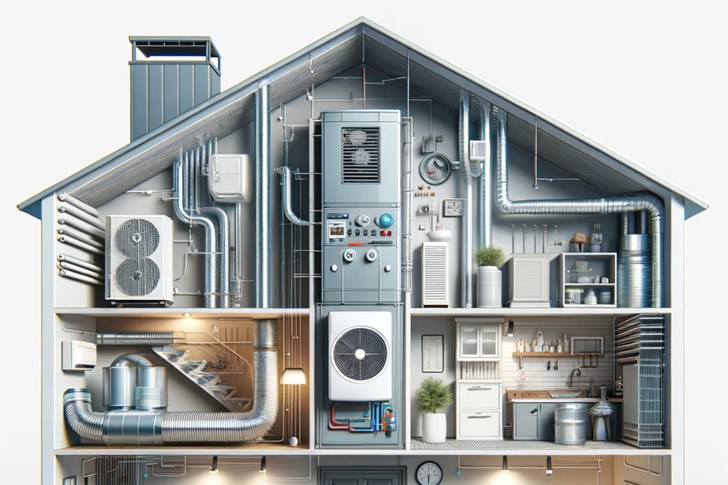What Is HVAC and How Does an HVAC System Work?
HVAC stands for Heating, Ventilation, and Air Conditioning. It’s a system used to provide heating and cooling services to buildings. HVAC systems are crucial for maintaining comfortable indoor environments in both residential and commercial settings. This article explains the components, functionality, and benefits of HVAC systems.

Introduction to HVAC
Heating, Ventilation, and Air Conditioning (HVAC) systems are essential for creating and maintaining indoor comfort. These systems regulate temperature, humidity, and air quality in homes, offices, and industrial buildings. Understanding how HVAC systems work can help you make informed decisions about installation, maintenance, and energy efficiency.
Components of an HVAC System
An HVAC system consists of several components that work together to heat, cool, and ventilate a space. The main components include:
- Heating Units
- Furnaces: Most common in residential applications, furnaces heat air using fuel such as natural gas, propane, oil, or electricity. The heated air is then distributed through ducts.
- Boilers: Used primarily in commercial buildings, boilers heat water or produce steam, which is then distributed via radiators or radiant floor systems.
- Heat Pumps: These devices transfer heat from outside to inside during winter and reverse the process in summer, providing both heating and cooling.
- Ventilation Systems
- Ductwork: Channels that distribute heated or cooled air throughout a building.
- Ventilators: Devices that exchange stale indoor air with fresh outdoor air.
- Air Filters: Remove dust, allergens, and other particles from the air before it is circulated.
- Air Conditioning Units
- Central Air Conditioners: These units cool air at a central location and distribute it through ducts.
- Split-System Air Conditioners: Consist of an outdoor compressor and an indoor evaporator coil, common in residential settings.
- Window Units: Compact units installed in windows, suitable for cooling single rooms.
- Thermostats and Controls
- Thermostats: Devices that allow users to set and maintain desired temperatures.
- Smart Thermostats: Advanced versions that can be programmed and controlled remotely via smartphones or computers, offering greater energy efficiency.
How HVAC Systems Work
Understanding the functioning of an HVAC system involves looking at how each component contributes to heating, cooling, and ventilation.
Heating Process
- Furnace Operation: When the thermostat signals a need for heat, the furnace ignites fuel or uses electric resistance to heat air.
- Heat Distribution: The blower motor pushes the heated air through the ductwork, distributing it throughout the building.
- Thermostat Control: Once the desired temperature is reached, the thermostat signals the furnace to shut off.
Cooling Process
- Refrigerant Cycle: Air conditioners and heat pumps use a refrigerant to absorb and release heat. The refrigerant evaporates and absorbs heat from indoor air in the evaporator coil.
- Heat Expulsion: The heated refrigerant is compressed and moves to the condenser coil outside, where it releases heat.
- Cooling Distribution: The blower motor circulates the cooled air through the ductwork.
Ventilation Process
- Air Exchange: Ventilators bring in fresh outdoor air and expel stale indoor air, maintaining indoor air quality.
- Filtration: Air filters remove contaminants from the air before it is circulated, improving overall air quality.
Importance of HVAC Systems
Comfort
HVAC systems ensure that indoor environments remain comfortable, regardless of external weather conditions. By maintaining consistent temperatures and humidity levels, HVAC systems prevent the discomfort associated with extreme heat or cold.
Health
Proper ventilation provided by HVAC systems helps reduce indoor air pollutants, such as dust, allergens, and volatile organic compounds (VOCs). This is particularly important for individuals with respiratory issues or allergies.
Energy Efficiency
Modern HVAC systems are designed to be energy-efficient, reducing energy consumption and lowering utility bills. According to the U.S. Department of Energy, upgrading to a high-efficiency HVAC system can reduce energy use by 20-50%.
Key Benefits of HVAC Systems
- Enhanced Air Quality: By filtering and circulating air, HVAC systems reduce indoor pollutants, leading to a healthier living environment.
- Energy Savings: Energy-efficient HVAC systems can significantly lower heating and cooling costs.
- Convenience: Automated and programmable thermostats allow for precise control over indoor temperatures, enhancing comfort and convenience.
- Longevity of Buildings: Proper ventilation helps prevent moisture buildup, reducing the risk of mold and structural damage.
Maintenance of HVAC Systems
Regular maintenance is crucial for ensuring the efficient operation and longevity of HVAC systems. Key maintenance tasks include:
- Regular Inspections: Have a professional inspect your HVAC system at least once a year to check for potential issues.
- Filter Replacement: Change air filters every 1-3 months to ensure optimal air quality and system efficiency.
- Cleaning: Keep components such as coils and ductwork clean to prevent dust and debris buildup.
- Thermostat Calibration: Ensure your thermostat is accurately measuring and controlling temperatures.
Choosing the Right HVAC System
When selecting an HVAC system, consider the following factors:
- Size of the Space: Ensure the system is appropriately sized for your home or building to avoid inefficiency and increased costs.
- Climate: Choose a system that can handle the climate conditions of your location, such as extreme cold or heat.
- Energy Efficiency: Look for systems with high SEER (Seasonal Energy Efficiency Ratio) ratings for air conditioners and high AFUE (Annual Fuel Utilization Efficiency) ratings for furnaces.
- Budget: Consider the initial cost, as well as long-term operating and maintenance costs.
Conclusion
HVAC systems are integral to maintaining comfortable, healthy, and energy-efficient indoor environments. By understanding how these systems work and the benefits they offer, you can make informed decisions about their installation, maintenance, and upgrades. Whether you’re considering a new system or seeking to optimize your current one, knowledge of HVAC systems is essential for ensuring long-term comfort and efficiency in your living or working spaces.







Recent Comments